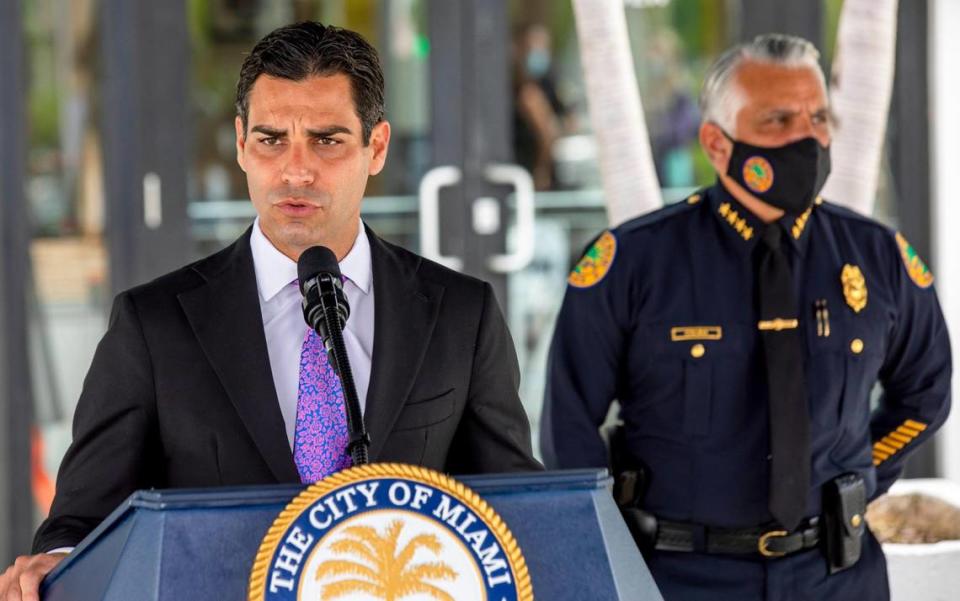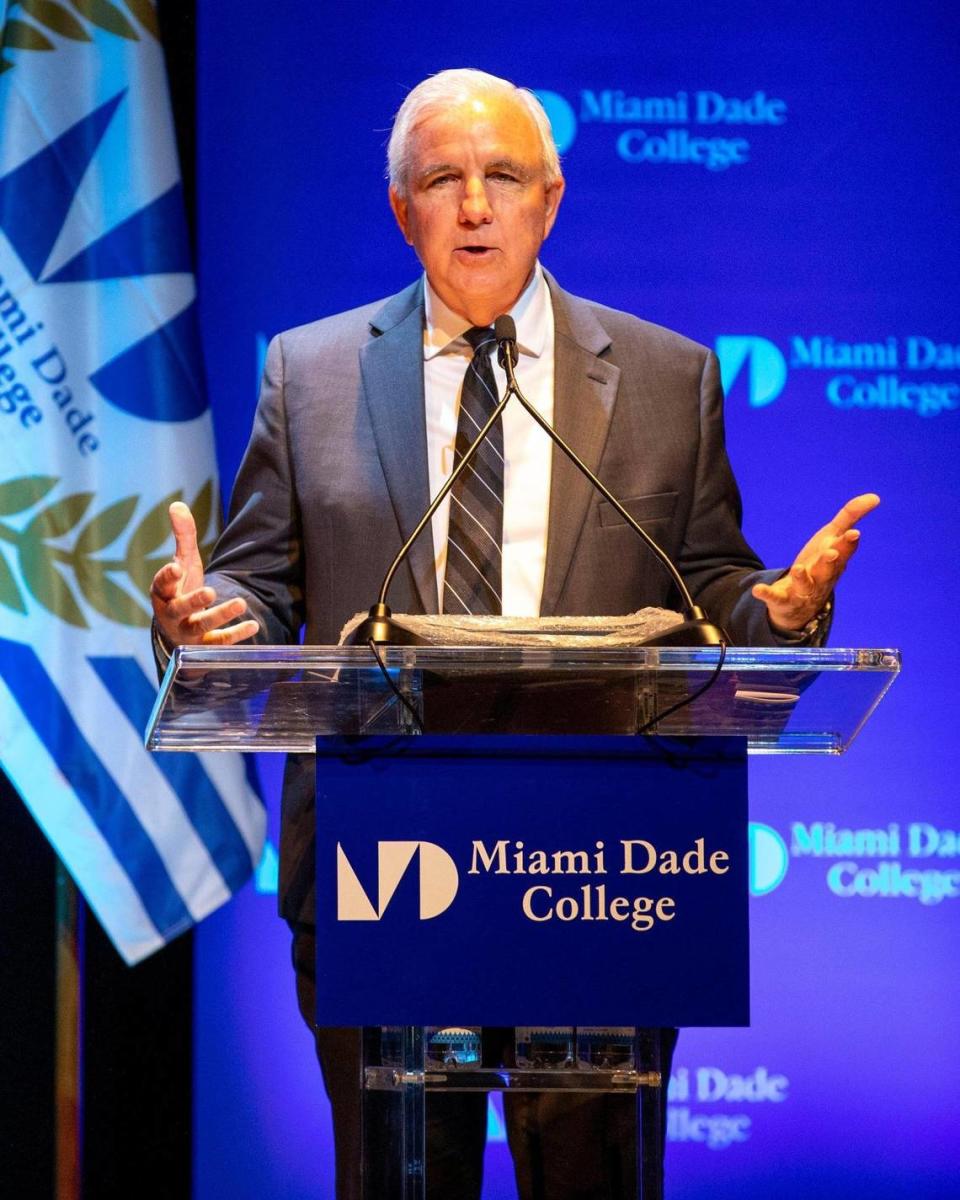As Miami’s part-time mayor, Francis Suarez has little power but a big spotlight
- Oops!Something went wrong.Please try again later.
When demonstrations and civil unrest hit Miami in the wake of George Floyd’s death, Mayor Francis Suarez was in the room where senior police commanders directed the city’s response to protests that led to ransacking of downtown stores.
Then the mayor with no administrative powers was politely encouraged to station himself somewhere farther away from the action, joining visiting city commissioners nearby, according to a former police chief.
“He was pretty much standing there where the decisions were being made,” Jorge Colina, the city’s police chief at the time, recalled on Thursday. “Eventually — of course, politely, delicately — I said: ‘What would be great, what I would be grateful for, is if everyone would hang out in a different room.’ ”
READ MORE: Francis Suarez, Miami’s Republican mayor, files to run for president in GOP primary
As he launches a campaign to run the United States as president, Miami’s 45-year-old Republican mayor is positioning himself at the center of the city’s response to crime, social ills and economic challenges.
“Now instead of 6,000 homeless, we have 608,” Suarez said in a launch video posted on his campaign website, touting Miami addiction programs and comparing city statistics from decades ago to Miami’s up-and-down tally of people living on the streets since the pandemic. “And I’m not finished yet.”
Now in his second term as Miami’s part-time mayor, Suarez doesn’t oversee police officers, garbage haulers or ambulance crews the way other big-city mayors do.

Instead, Suarez’s power mostly falls on the legislative side. He has veto authority over city commission legislation. He can declare emergencies, and hire and fire the city manager who runs Miami’s government, though commissioners can overrule a mayor’s pick for the top job.
Still, Suarez is the most high-profile figure in government for the city of 440,000 residents, and he’s used his position as mayor to influence big decisions. Suarez secured a tight vote on the city commission last year to approve David Beckham’s commercial complex and soccer stadium on a city golf course.
Miami’s elected ambassador
He’s best known as an evangelist for Miami’s role as a tech and finance hub, especially after his viral Twitter post asking “How can I help?” to an investment fund floating the idea of moving all of Silicon Valley to Miami in late 2020. Two years later, the Financial Times declared Miami “the most important city in America” and Suarez was invited to speak at the buzzy World Economic Forum held each year in Davos, Switzerland.
Saif Ishoof, a former Suarez adviser who now co-owns a business consulting firm in Miami, credited the mayor with tapping local colleges and non-profits to focus on tech training, encouraging investment funds to increase allocations for South Florida start-ups, and promoting Miami as a welcoming place to do business.
“It was a focus on the ecosystem,” said Ishoof, a partner in Lab22c. “I think he’s an effective story teller and someone who has a strong command of the data behind it. That’s really what is needed.”
Suarez’s influence within city government is now under scrutiny after the Miami Herald reported he received $10,000 a month from developer Rishi Kapoor, who in turn sought help from Suarez’s office for permitting issues the city’s building department ultimately resolved in the developer’s favor.
Suarez, a lawyer, said his work for Kapoor didn’t touch on city matters and that the help from his staff was routine assistance available to all builders.
Criticism from former county mayor Gimenez
With no daily role in city administration, Suarez is getting heat for lashing his presidential launch to Miami’s accomplishments. Carlos Gimenez, a former Miami-Dade County mayor supporting former President Donald Trump in the GOP primary, went on television this week to blast Suarez as a “phony” trying to inflate his credentials.
“I need to let people know about this illusion he’s trying to paint,” said Gimenez, now a Republican member of Congress representing suburbs outside Miami and the Florida Keys. “That somehow everything happening in Miami is because of him.”

The two clashed when both were mayors during the first year of the COVID-19 pandemic. Unlike Suarez, Gimenez held a post with administrative power, with Miami-Dade’s charter giving the mayor full authority over all county employees, including police.
The two also competed to be the leading voice of the Miami area during the crisis, with Gimenez complaining Suarez tried to speak on matters that weren’t his purview.
Early in the pandemic, Suarez sent a letter to the White House urging Trump to suspend flights to Miami International Airport from U.S. and foreign cities with high rates of COVID-19 infection. “My administration stands ready to provide any assistance within our power,” Suarez wrote Trump in the April 2, 2020 letter.
The request didn’t sit well with Gimenez, who was overseeing the county-owned airport. His administration sent a letter the next day to Washington noting Suarez had no authority over MIA, and flights continued. “I want to make sure people understand what he’s selling is not true,” Gimenez said.
Taking credit for a drop in crime
Suarez’s campaign site links to a Fox News essay he wrote in April offering Miami as a national model on how to fight crime. “We increased funding for our police, growing our police department to its largest in our history,” Suarez wrote. “The result: crime dropped to one of its lowest levels in Miami’s history.”
Suarez didn’t veto City Manager Art Noriega’s budget proposal in 2020 that had position cuts in the police department and reduced total positions in the agency from 1,805 to 1,672, according to a budget summary on the city’s website. The latest budget shows an 8% increase to 1,803 positions.
While he wasn’t overseeing the police response to demonstrations in 2020, Suarez played a central role in the city’s public response to the violence and protests.
“I want to thank members of the Miami Police Department who demonstrated incredible restraint and resolve in the face of provocative acts and personal attacks over the past day,” Suarez said at the start of a May 31, 2020 press conference. “We will get through these difficult times, and do right by our citizens.”
Colina, the former police chief who left the city in 2021, said he’s not ready to support Suarez as he seeks the highest office in the country.
“Would I vote for him as president? No,” said Colina, an independent. “It’s president of the United States. I personally would look at someone with more experience.”

